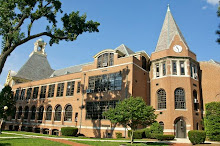I went to the Board of Ed meeting on Monday night to ask some questions and raise some concerns about one of the sections of revised policy that was having its first reading. Specifically my comments were about Policy #5600, which is the Extracurricular Code of Conduct. This is the policy that says actions of a student outside of school – for example, drinking or smoking – can be punished by the school, by restricting the student’s participation in extracurricular activities such as sports or clubs.
I’ve always had a problem with this policy, mainly because it seems to stretch the school’s business a little further than necessary. On top of that, I feel that if the school is going to have this type of policy, then it needs to be extremely clear and detailed, and should clearly spell out exactly how infractions that occur on a Friday night when no adults (let alone school staff) are around are going to be confirmed. It bothers me that a kid might be present at a home, it might even be a party, he might choose not to engage in any illegal behavior, but could be reported to the principal as drinking. How is he going to prove otherwise? Where is the due process? The presumption of innocence?
The policy contains very specific information about consequences, but what the behaviors are, and how that info will be verified, is not specific at all – in fact it’s not even mentioned. I think this opens up some confusion on the part of students and parents.
The policy mentions that the principal may act if there is a reasonable basis that a violation may have occurred. I think that language is vague and a little bit concerning… Whether it’s done within the policy or whether it’s communicated in another way, as a parent I would like to understand what guidelines or rubric the principal will use in deciding what to pursue and what not to pursue, how will he separate rumors from facts…and how will students’ due process rights be maintained?
Dr. Fishbein’s answer to this question Monday night was that the principal will rely on the reports of witnesses. I don’t think that really answered my concern.
The final issue I raised on Monday was to ask how Ridgewood’s extracurricular code of conduct differs from that of Ramapo-Indian Hills, which was overturned by the Commissioner of Education, who found it to be unlawful. As I understand it, that precedent applies to all districts in New Jersey. Dr. Fishbein pointed to a sentence in the policy that was added by our district’s lawyer, which purports to address the Commissioner’s objection. It states that the school may only impose discipline for activity that occurs outside of school, if that behavior “materially and substantially interferes with the requirements of appropriate discipline in the operation of the school or its programs…” I trust that the lawyer believes this addresses the concern…I can’t say I’m sold on the idea that a kid having a beer on Friday night automatically materially or substantially interferes with school on Monday. I guess it will take someone challenging the policy legally to put it to a constitutional test.
As I said Monday night, of course I support the intent of this policy, insofar as it deals with safety of students, but I think it’s confusing and vague and, for that reason, I don’t think it actually improves the safety of students enough to warrant the conflict with their rights. Truthfully, sometimes when I think about it, I admit I'm torn: if the policy results in some kids changing their behavior because they're afraid of the consequences, and if that means a kid avoids injury or worse, does that make it all worth while? Does the end justify the means? Does it ever? Are the rules different when kids' safety is involved?
It was a little odd to attend the meeting and make comments from the podium, but I thought it was important to ask those questions in public so there’s a record of the dialogue and so that other parents who might have questions can participate.
You can click here to read the Patch.com report on my comments from Monday night.
Welcome!
Welcome to Laurie Goodman's blog. I use this space to share news and opinions about education and schools in Ridgewood, the state of New Jersey and the nation, in addition to other issues I'm personally interested in. I invite you to share your thoughts, feelings, questions or opinions, too, by posting comments on any blog entry. Please observe basic courtesy -- keep your comments focused on issues, no personal attacks or bullying, please. Contact me directly at: lauriegood@mac.com
Subscribe to:
Post Comments (Atom)






No comments:
Post a Comment